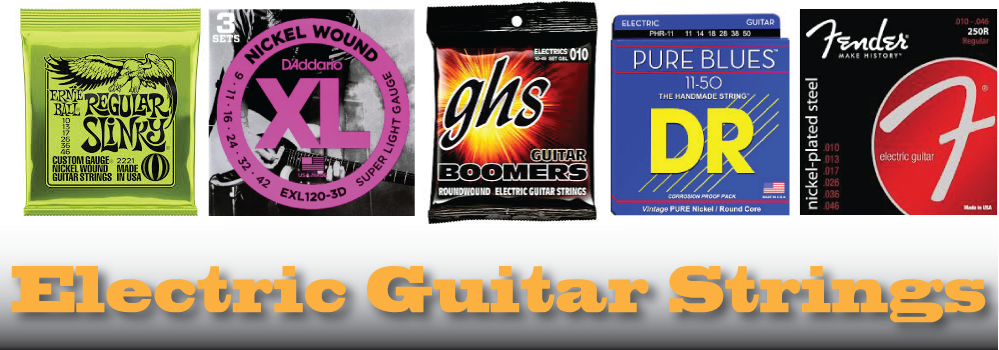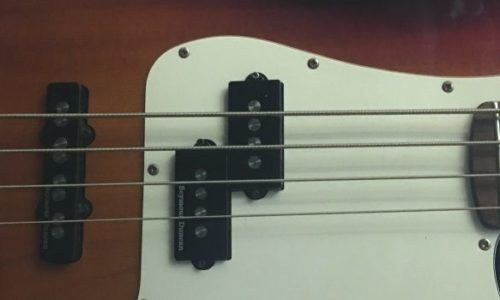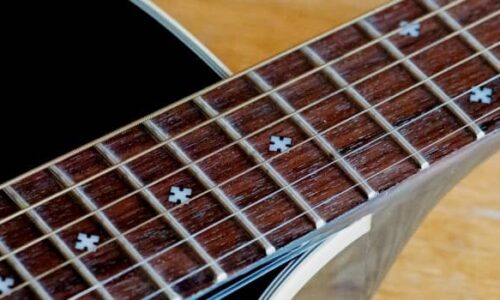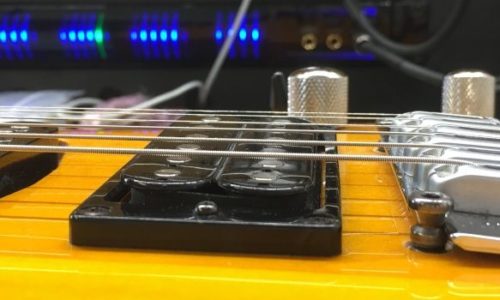How to Choose the Best Strings For Electric Guitar and Bass Guitar

Are you asking yourself “How do I choose guitar strings”? If so, this article is for you. Read on to learn about electric guitar strings and electric bass guitar strings.
Choosing guitar strings that fit your playing style, and properly installing your guitar strings, is a low-cost way to make a big difference in sound. If you own multiple guitars or bass guitars you may want to do a different guitar setup, including types of strings, to get a good comparison of how much strings impact the playability and sound of your instrument. When you contact a guitar shop for strings repair they can help you find the best strings for your guitar.
We recommend reading the entire article to get a better understanding of types of strings, guitar string brands, gauges (sizes), and why changing strings may require minor modifications to your guitar. If you ever have questions you should consult with your local guitar shop for expert guitar string replacement recommendations.
Guitar Strings – A Quick Intro
Guitar strings generate the sound waves that create the sound you hear. Pitch is affected by a guitar string size (gauge) in as much as thin strings have higher pitch vs. thicker strings have a lower pitch. Tuning, including adjusting tuning machine heads and intonation, is how your guitar becomes able to produce a balanced, pleasant sound.
Other factors affecting sound output, which a novice player may not recognize, are the composition, coatings, age, condition, and even cleanliness of the strings. How much you play your guitar is a top factor in how often to replace guitar strings.
What Are the Types of Guitar Strings?
Anyone who is seriously interested in becoming a better guitar player you need to learn about the numerous types of guitar strings. Understanding guitar string construction and materials can help you to make a better decision on what types of strings best work for your style and budget.
Guitar String Construction
The primary attributes of guitar strings are the types of string core, winding, coating, and finished string gauge.
Within these attributes, you will experience different results based on the combinations of these attributes and the quality of the strings. Keep in mind that as strings are used and age the sound quality will diminish.
Electric guitar strings are manufactured from steel, nickel, or other magnetically conductive metal alloys. The typical string has a steel core and a “silver-nickel” outside (winding). Despite the name, silver is not used in making guitar strings.
The sound produced by strings is heavily influenced by the combination of the strings core, winding, and plating or coating.
Here is what you can expect from the most common types of guitar strings sold in the United States:
- Nickel-Plated Steel: is the most popular string type. They deliver exceptional brightness, warmth, and full-bodied tones.
- Pure Nickel: is a step down in brightness from nickel-plated strings, but a workable string for most types of music. With the cost being about the same it’s hard to imagine why a guitarist would not buy nickel-plated strings instead of these.
- Stainless Steel: is the choice for a sharp, crisp tone. Corrosion protection is great, but they are stiffer than most people prefer.
- Chrome: Often preferred by blues or jazz guitarists, chrome strings have a warmer sound but sorely lack resonance.
- Cobalt: offer great pickup response with crisp brightness across a wide range.
- Polymer-Coated: These provide corrosion resistance which can help them to last longer but they have far less sustain than their un-coated equivalent.
- Nylon Strings: These strings are lighter and easier on your fingers. A drawback is that nylon strings stretch which which means keeping them in tune is nearly impossible.
NOTE ABOUT COATED STRINGS: Coated strings are a standard string upon which a polymer finish has been applied. While the life of a coated string is longer, you sacrifice a lot on high-end response and overall sound quality. Coated strings are almost always more expensive than un-coated strings. Our recommendation is to change strings more often with un-coated strings vs trying to stretch out string life with more costly coated strings.
Types of Guitar String Cores
The string core refers to the shape of the wire which is either hex core or round core. These two types have subtle differences in playability and sustain, but these differences are virtually unnoticeable by the average guitar player.
Hex core strings offer a brighter, louder tone which lends itself better to post-90’s rock or country music.
Round core strings deliver a smooth, mellow tone which works well for blues, classic country, and older rock music.
Types of Guitar String Winding
At a top level, you should be able to recognize that thin strings (like a high B, E, or G) are solid (not wound). Heavier strings are wound and can be recognized as such by the texture of the string surface. Types of electric guitar string windings include round-wound, flat-wound and half-round.
Round-wound Guitar Strings
These are the most common type of guitar strings and are appropriate for virtually any music genre. They deliver a very bright tone with a solid, full-bodied sound. We suggest always using round-wound strings – buy a good brand and you won’t be disappointed.
Flat-wound Guitar Strings
Flat-wound guitar strings have a flat playing surface which produces a dark, subdued tone. Most people find these difficult to play and not particularly great sounding strings. If you’re a beginner or novice player you should skip over these strings.
Half-round Guitar Strings
Half-round guitar strings fall in the middle-ground between roundwound and flatwound. As with flatwound, they are challenging to play and do not provide the tone that fits popular genres such as rock, metal, country, and blues.
Guitar String Coatings
Guitar String Gauges
In the guitar manufacturing industry there are common standards for guitar strings gauges and paired sets of strings. Individual strings are sold for guitar players who want to customize their sound. Mixing brands and string gauges can deliver a very unique sound. For beginner and novice guitar players it’s a good idea to stick with guitar string sets for which your guitar was made.
The industry standard for guitar string sets is generally as follows:
Electric Guitar String Sets
The following are common string set sizes for a 6-string electric guitar. These are listed with their common name and string gauges. Guitar players often refer to string sets with a shortened description using the gauge of the lightest and heaviest strings, i.e., a light set could be referred to as 10-46 (spoken as ten forty-six), although the full set has gauge sizes of .010 .013 .017 .026 .036 .046
- Extra Super Light .008 .010 .015 .021 .030 .038
- Super Light .009 .011 .016 .024 .032 .042
- Light .010 .013 .017 .026 .036 .046
- Medium .011 .015 .018 .026 .036 .050
- Heavy .012 .016 .020 .032 .042 .054
Bass Guitar String Sets
The following are common string set sizes for a 4-string bass guitar. These are listed with their common name and string gauges. There are some differences in names such as Ernie Ball Super Slinky and D’Addario Regular Light are the same sized set. As with electric guitar strings these sets may be referred to in slang such as “45-100” (spoken forty-five one hundred).
- Light .045 .065 .080 .100
- Medium .50 .70. .85 .105
- Heavy .50. .67 . 90 .120
Every guitar is manufactured with a set of specifications which includes the appropriate string sizes. This typically corresponds to one of the “string sets” previously mentioned.
Read This Before Changing String Gauges
String nut slot widths vary in size because they are cut to fit each individual string size. If you change string sizes (gauges) on your guitar you should contact a nearby guitar repair shop for adjusting nut slot widths.
NOTE: Having a slot width that accommodates the string gauge allows the string to move freely when the string is played. A string that does not move freely may have erratic tuning and is more prone to breaking at that point.
Best Places to Buy Guitar Strings
If you own a guitar you will need to know where to buy replacement guitar strings. If you live in a town of any significant size you can probably find a local guitar store that sells strings. Regardless of where you live, you can usually find great deals on guitar strings from online stores such as Sweetwater Music.




Fantastic site. Lots of useful information here. I’m sending it to a few padna’s
Coated strings for acoustic guitars – can’t go wrong.
Great resource! Easy to just follow the links below for advice on choosing the best acoustic strings, electric strings, or bass strings for you.
Great article that helped me to get an unbiased view of the best guitar strings. Obviously personal preference in tone and playability are opinions, but at least I’ve found an article that’s not serving paid advertising suggestions. Thanks!
Great article that helped me to get an unbiased view of the best guitar strings. Obviously personal preference in tone and playability are opinions, but at least I’ve found an article that’s not serving paid advertising suggestions. Thanks!
Thanks for your article on guitar maintenance and care. You always you hit on things that I don’t know or think about.
Thanks for all the work you put into your articles.